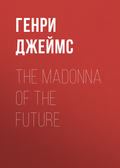
Генри Джеймс
The Birthplace
It was, he even himself felt at this moment, wonderfully done; no auditors, for all his thousands, had ever yet so inspired him. The odd slightly alarmed shyness in the two faces, as if in a drawing-room, in their "good society" exactly, some act incongruous, something grazing the indecent, had abruptly been perpetrated, the painful reality of which stayed itself before coming home—the visible effect on his friends in fine wound him up as to the sense that they were worth the trick. It came of itself now—he had got it so by heart; but perhaps really it had never come so well, with the staleness so disguised, the interest so renewed and the clerical unction demanded by the priestly character so successfully distilled. Mr. Hayes of New York had more than once looked at his wife, and Mrs. Hayes of New York had more than once looked at her husband—only, up to now, with a stolen glance, with eyes it hadn't been easy to detach from the remarkable countenance by the aid of which their entertainer held them. At present, however, after an exchange less furtive, they ventured on a sign that they hadn't been appealed to in vain. "Charming, charming, Mr. Gedge!" Mr. Hayes broke out. "We feel that we've caught you in the mood."
His wife hastened to assent—it eased the tension. "It would be quite the way; except," she smiled, "that you'd be too dangerous. You've really a genius!"
Gedge looked at her hard, but yielding no inch, even though she touched him there at a point of consciousness that quivered. This was the prodigy for him, and had been, the year through—that he did it all, he found, easily, did it better than he had done anything else in life; with so high and broad an effect, in truth, an inspiration so rich and free, that his poor wife now, literally, had been moved more than once to fresh fear. She had had her bad moments, he knew, after taking the measure of his new direction—moments of readjusted suspicion in which she wondered if he hadn't simply adopted another, a different perversity. There would be more than one fashion of giving away the Show, and wasn't this perhaps a question of giving it away by excess? He could dish them by too much romance as well as by too little; she hadn't hitherto fairly grasped that there might be too much. It was a way like another, at any rate, of reducing the place to the absurd; which reduction, if he didn't look out, would reduce them again to the prospect of the streets, and this time surely without appeal. It all depended indeed—he knew she knew that—on how much Grant-Jackson and the others, how much the Body, in a word, would take. He knew she knew what he himself held it would take—that he considered no limit could be imputed to the quantity. They simply wanted it piled up, and so did every one else; wherefore if no one reported him as before why were They to be uneasy? It was in consequence of idiots tempted to reason that he had been dealt with before; but as there was now no form of idiocy that he didn't systematically flatter, goading it on really to its own private doom, who was ever to pull the string of the guillotine? The axe was in the air—yes; but in a world gorged to satiety there were no revolutions. And it had been vain for Isabel to ask if the other thunder-growl also hadn't come out of the blue. There was actually proof positive that the winds were now at rest. How could they be more so?—he appealed to the receipts. These were golden days—the Show had never so flourished. So he had argued, so he was arguing still—and, it had to be owned, with every appearance in his favour. Yet if he inwardly winced at the tribute to his plausibility rendered by his flushed friends, this was because he felt in it the real ground of his optimism. The charming woman before him acknowledged his "genius" as he himself had had to do. He had been surprised at his facility until he had grown used to it. Whether or no he had, as a fresh menace to his future, found a new perversity, he had found a vocation much older, evidently, than he had at first been prepared to recognise. He had done himself injustice. He liked to be brave because it came so easy; he could measure it off by the yard. It was in the Birthroom, above all, that he continued to do this, having ushered up his companions without, as he was still more elated to feel, the turn of a hair. She might take it as she liked, but he had had the lucidity—all, that is, for his own safety—to meet without the grace of an answer the homage of her beautiful smile. She took it apparently, and her husband took it, but as a part of his odd humour, and they followed him aloft with faces now a little more responsive to the manner in which on that spot he would naturally come out. He came out, according to the word of his assured private receipt, "strong." He missed a little, in truth, the usual round-eyed question from them—the inveterate artless cue with which, from moment to moment, clustered troops had for a year obliged him. Mr. and Mrs. Hayes were from New York, but it was a little like singing, as he had heard one of his Americans once say about something, to a Boston audience. He did none the less what he could, and it was ever his practice to stop still at a certain spot in the room and, after having secured attention by look and gesture, suddenly shoot off: "Here!"
They always understood, the good people—he could fairly love them now for it; they always said breathlessly and unanimously "There?" and stared down at the designated point quite as if some trace of the grand event were still to be made out. This movement produced he again looked round. "Consider it well: the spot of earth–!" "Oh but it isn't earth!" the boldest spirit—there was always a boldest—would generally pipe out. Then the guardian of the Birthplace would be truly superior—as if the unfortunate had figured the Immortal coming up, like a potato, through the soil. "I'm not suggesting that He was born on the bare ground. He was born here!"—with an uncompromising dig of his heel. "There ought to be a brass, with an inscription, let in." "Into the floor?"—it always came. "Birth and burial: seedtime, summer, autumn!"—that always, with its special right cadence, thanks to his unfailing spring, came too. "Why not as well as into the pavement of the church?—you've seen our grand old church?" The former of which questions nobody ever answered—abounding, on the other hand, to make up, in relation to the latter. Mr. and Mrs. Hayes even were at first left dumb by it—not indeed, to do them justice, having uttered the word that called for it. They had uttered no word while he kept the game up, and (though that made it a little more difficult) he could yet stand triumphant before them after he had finished with his flourish. Only then it was that Mr. Hayes of New York broke silence.
"Well, if we wanted to see I think I may say we're quite satisfied. As my wife says, it would seem your line." He spoke now, visibly, with more ease, as if a light had come: though he made no joke of it, for a reason that presently appeared. They were coming down the little stair, and it was on the descent that his companion added her word.
"Do you know what we half did think–?" And then to her husband: "Is it dreadful to tell him?" They were in the room below, and the young woman, also relieved, expressed the feeling with gaiety. She smiled as before at Morris Gedge, treating him as a person with whom relations were possible, yet remaining just uncertain enough to invoke Mr. Hayes's opinion. "We have awfully wanted—from what we had heard." But she met her husband's graver face; he was not quite out of the wood. At this she was slightly flurried—but she cut it short. "You must know—don't you?—that, with the crowds who listen to you, we'd have heard."
He looked from one to the other, and once more again, with force, something came over him. They had kept him in mind, they were neither ashamed nor afraid to show it, and it was positively an interest on the part of this charming creature and this keen cautious gentleman, an interest resisting oblivion and surviving separation, that had governed their return. Their other visit had been the brightest thing that had ever happened to him, but this was the gravest; so that at the end of a minute something broke in him and his mask dropped of itself. He chucked, as he would have said, consistency; which, in its extinction, left the tears in his eyes. His smile was therefore queer. "Heard how I'm going it?"
The young man, though still looking at him hard, felt sure, with this, of his own ground. "Of course you're tremendously talked about. You've gone round the world."
"You've heard of me in America?"
"Why almost of nothing else!"
"That was what made us feel–!" Mrs. Hayes contributed.
"That you must see for yourselves?" Again he compared, poor Gedge, their faces. "Do you mean I excite—a—scandal?"
"Dear no! Admiration. You renew so," the young man observed, "the interest."
"Ah there it is!" said Gedge with eyes of adventure that seemed to rest beyond the Atlantic.
"They listen, month after month, when they're out here, as you must have seen; then they go home and talk. But they sing your praise."
Our friend could scarce take it in. "Over there!"
"Over there. I think you must be even in the papers."
"Without abuse?"
"Oh we don't abuse every one."
Mrs. Hayes, in her beauty, it was clear, stretched the point. "They rave about you."
"Then they don't know?"
"Nobody knows," the young man declared; "it wasn't any one's knowledge, at any rate, that made us uneasy."
"It was your own? I mean your own sense?"
"Well, call it that. We remembered, and we wondered what had happened. So," Mr. Hayes now frankly laughed, "we came to see."
Gedge stared through his film of tears. "Came from America to see me?"
"Oh a part of the way. But we wouldn't, in England, have missed you."
"And now we haven't!" the young woman soothingly added.
Gedge still could only gape at the candour of the tribute. But he tried to meet them—it was what was least poor for him—in their own key. "Well, how do you like it?"
Mrs. Hayes, he thought—if their answer were important—laughed a little nervously. "Oh you see."
Once more he looked from one to the other. "It's too beastly easy, you know."
Her husband raised his eyebrows. "You conceal your art. The emotion—yes; that must be easy; the general tone must flow. But about your facts—you've so many: how do you get them through?"
Gedge wondered. "You think I get too many–?"
At this they were amused together. "That's just what we came to see!"
"Well, you know, I've felt my way; I've gone step by step; you wouldn't believe how I've tried it on. This—where you see me—is where I've come out." After which, as they said nothing: "You hadn't thought I could come out?"
Again they just waited, but the husband spoke: "Are you so awfully sure you are out?"
Gedge drew himself up in the manner of his moments of emotion, almost conscious even that, with his sloping shoulders, his long lean neck and his nose so prominent in proportion to other matters, he resembled the more a giraffe. It was now at last he really caught on. "I may be in danger again—and the danger is what has moved you? Oh!" the poor man fairly moaned. His appreciation of it quite weakened him, yet he pulled himself together. "You've your view of my danger?"
It was wondrous how, with that note definitely sounded, the air was cleared. Lucid Mr. Hayes, at the end of a minute, had put the thing in a nutshell. "I don't know what you'll think of us—for being so beastly curious."
"I think," poor Gedge grimaced, "you're only too beastly kind."
"It's all your own fault," his friend returned, "for presenting us (who are not idiots, say) with so striking a picture of a crisis. At our other visit, you remember," he smiled, "you created an anxiety for the opposite reason. Therefore if this should again be a crisis for you, you'd really give us the case with an ideal completeness."
"You make me wish," said Morris Gedge, "that it might be one."
"Well, don't try—for our amusement—to bring one on. I don't see, you know, how you can have much margin. Take care—take care."
Gedge did it pensive justice. "Yes, that was what you said a year ago. You did me the honour to be uneasy—as my wife was."
Which determined on the young woman's part an immediate question. "May I ask then if Mrs. Gedge is now at rest?"
"No—since you do ask. She fears at least that I go too far; she doesn't believe in my margin. You see we had our scare after your visit. They came down."
His friends were all interest. "Ah! They came down?"
"Heavy. They brought me down. That's why—"
"Why you are down?" Mrs. Hayes sweetly demanded.
"Ah but my dear man," her husband interposed, "you're not down; you're up! You're only up a different tree, but you're up at the tip-top."
"You mean I take it too high?"
"That's exactly the question," the young man answered; "and the possibility, as matching your first danger, is just what we felt we couldn't, if you didn't mind, miss the measure of."
Gedge gazed at him. "I feel that I know what you at bottom hoped."
"We at bottom 'hope,' surely, that you're all right?"
"In spite of the fool it makes of every one?"
Mr. Hayes of New York smiled. "Say because of that. We only ask to believe every one is a fool!"
"Only you haven't been, without reassurance, able to imagine fools of the size that my case demands?" And Gedge had a pause while, as if on the chance of some proof, his companion waited. "Well, I won't pretend to you that your anxiety hasn't made me, doesn't threaten to make me, a bit nervous; though I don't quite understand it if, as you say, people but rave about me."
"Oh that report was from the other side; people in our country so very easily rave. You've seen small children laugh to shrieks when tickled in a new place. So there are amiable millions with us who are but small shrieking children. They perpetually present new places for the tickler. What we've seen in further lights," Mr. Hayes good-humouredly pursued, "is your people here—the Committee, the Board, or whatever the powers to whom you're responsible."
"Call them my friend Grant-Jackson then—my original backer, though I admit for that reason perhaps my most formidable critic. It's with him practically I deal; or rather it's by him I'm dealt with—was dealt with before. I stand or fall by him. But he has given me my head."
"Mayn't he then want you," Mrs. Hayes inquired, "just to show as flagrantly running away?"
"Of course—I see what you mean. I'm riding, blindly, for a fall, and They're watching (to be tender of me!) for the smash that may come of itself. It's Machiavellic—but everything's possible. And what did you just now mean," Gedge asked—"especially if you've only heard of my prosperity—by your 'further lights'?"
His friends for an instant looked embarrassed, but Mr. Hayes came to the point. "We've heard of your prosperity, but we've also, remember, within a few minutes, heard you."
"I was determined you should," said Gedge. "I'm good then—but I overdo?" His strained grin was still sceptical.
Thus challenged, at any rate, his visitor pronounced. "Well, if you don't; if at the end of six months more it's clear that you haven't overdone; then, then——"
"Then what?"
"Then it's great."
"But it is great—greater than anything of the sort ever was. I overdo, thank goodness, yes; or I would if it were a thing you could."
"Oh well, if there's proof that you can't–!" With which and an expressive gesture Mr. Hayes threw up his fears.
His wife, however, for a moment seemed unable to let them go. "Don't They want then any truth?—none even for the mere look of it?"
"The look of it," said Morris Gedge, "is what I give!"
It made them, the others, exchange a look of their own. Then she smiled. "Oh, well, if they think so–!"
"You at least don't? You're like my wife—which indeed, I remember," Gedge added, "is a similarity I expressed a year ago the wish for! At any rate I frighten her."
The young husband, with an "Ah wives are terrible!" smoothed it over, and their visit would have failed of further excuse had not at this instant a movement at the other end of the room suddenly engaged them. The evening had so nearly closed in, though Gedge, in the course of their talk, had lighted the lamp nearest them, that they had not distinguished, in connexion with the opening of the door of communication to the warden's lodge, the appearance of another person, an eager woman who in her impatience had barely paused before advancing. Mrs. Gedge—her identity took but a few seconds to become vivid—was upon them, and she had not been too late for Mr. Hayes's last remark. Gedge saw at once that she had come with news; no need even, for that certitude, of her quick retort to the words in the air—"You may say as well, sir, that they're often, poor wives, terrified!" She knew nothing of the friends whom, at so unnatural an hour, he was showing about; but there was no livelier sign for him that this didn't matter than the possibility with which she intensely charged her "Grant-Jackson, to see you at once!"—letting it, so to speak, fly in his face.
"He has been with you?"
"Only a minute—he's there. But it's you he wants to see."
He looked at the others. "And what does he want, dear?"
"God knows! There it is. It's his horrid hour—it was that other time."
She had nervously turned to the others, overflowing to them, in her dismay, for all their strangeness—quite, as he said to himself, like a woman of the people. She was the bareheaded good wife talking in the street about the row in the house, and it was in this character that he instantly introduced her: "My dear doubting wife, who will do her best to entertain you while I wait upon our friend." And he explained to her as he could his now protesting companions—"Mr. and Mrs. Hayes of New York, who have been here before." He knew, without knowing why, that her announcement chilled him; he failed at least to see why it should chill him so much. His good friends had themselves been visibly affected by it, and heaven knew that the depths of brooding fancy in him were easily stirred by contact. If they had wanted a crisis they accordingly had found one, albeit they had already asked leave to retire before it. This he wouldn't have. "Ah no, you must really see!"
"But we shan't be able to bear it, you know," said the young woman, "if it is to turn you out."
Her crudity attested her sincerity, and it was the latter, doubtless, that instantly held Mrs. Gedge. "It is to turn us out."
"Has he told you that, madam?" Mr. Hayes inquired of her—it being wondrous how the breath of doom had drawn them together.
"No, not told me; but there's something in him there—I mean in his awful manner—that matches too well with other things. We've seen," said the poor pale lady, "other things enough."
The young woman almost clutched her. "Is his manner very awful?"
"It's simply the manner," Gedge interposed, "of a very great man."
"Well, very great men," said his wife, "are very awful things."
"It's exactly," he laughed, "what we're finding out! But I mustn't keep him waiting. Our friends here," he went on, "are directly interested. You mustn't, mind you, let them go until we know."
Mr. Hayes, however, held him; he found himself stayed. "We're so directly interested that I want you to understand this. If anything happens–"
"Yes?" said Gedge, all gentle as he faltered.
"Well, we must set you up."
Mrs. Hayes quickly abounded. "Oh do come to us!"
Again he could but take them in. They were really wonderful folk. And with it all but Mr. and Mrs. Hayes! It affected even Isabel through her alarm; though the balm, in a manner, seemed to foretell the wound. He had reached the threshold of his own quarters; he stood there as at the door of the chamber of judgement. But he laughed; at least he could be gallant in going up for sentence. "Very good then—I'll come to you!"
This was very well, but it didn't prevent his heart, a minute later, at the end of the passage, from thumping with beats he could count. He had paused again before going in; on the other side of this second door his poor future was to be let loose at him. It was broken, at best, and spiritless, but wasn't Grant-Jackson there like a beast-tamer in a cage, all tights and spangles and circus attitudes, to give it a cut with the smart official whip and make it spring at him? It was during this moment that he fully measured the effect for his nerves of the impression made on his so oddly earnest friends—whose earnestness he verily, in the spasm of this last effort, came within an ace of resenting. They had upset him by contact; he was afraid literally of meeting his doom on his knees; it wouldn't have taken much more, he absolutely felt, to make him approach with his forehead in the dust the great man whose wrath was to be averted. Mr. and Mrs. Hayes of New York had brought tears to his eyes, but was it to be reserved for Grant-Jackson to make him cry like a baby? He wished, yes, while he palpitated, that Mr. and Mrs. Hayes of New York hadn't had such an eccentricity of interest, for it seemed somehow to come from them that he was going so fast to pieces. Before he turned the knob of the door, however, he had another queer instant; making out that it had been, strictly, his case that was interesting, his funny power, however accidental, to show as in a picture the attitude of others—not his poor pale personality. It was this latter quantity, none the less, that was marching to execution. It is to our friend's credit that he believed, as he prepared to turn the knob, that he was going to be hanged; and it's certainly not less to his credit that his wife, on the chance, had his supreme thought. Here it was that—possibly with his last articulate breath—he thanked his stars, such as they were, for Mr. and Mrs. Hayes of New York. At least they would take care of her.







